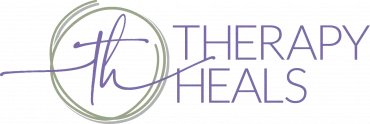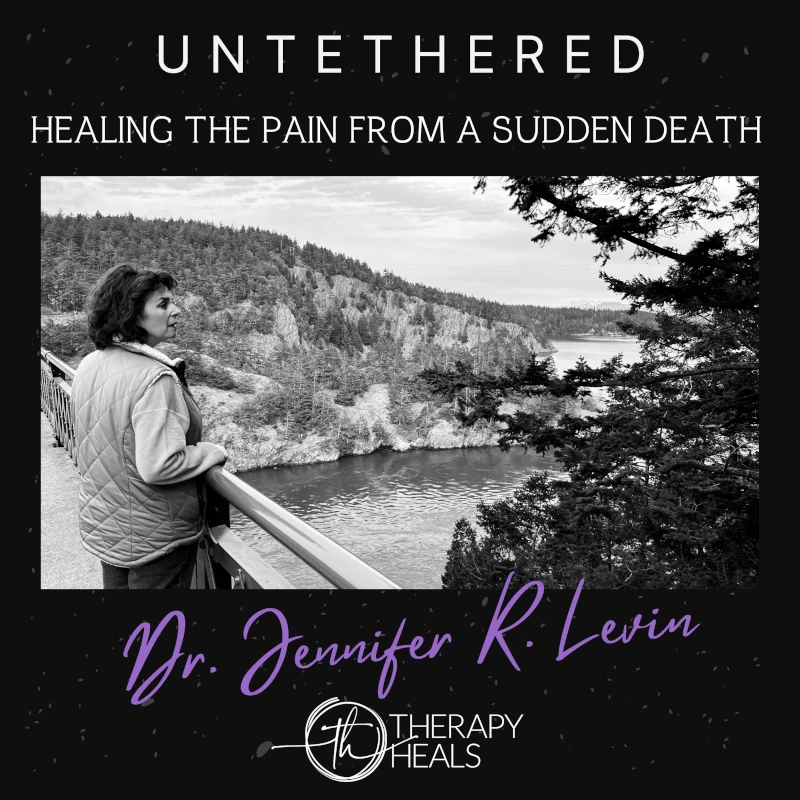Guidance in Grief 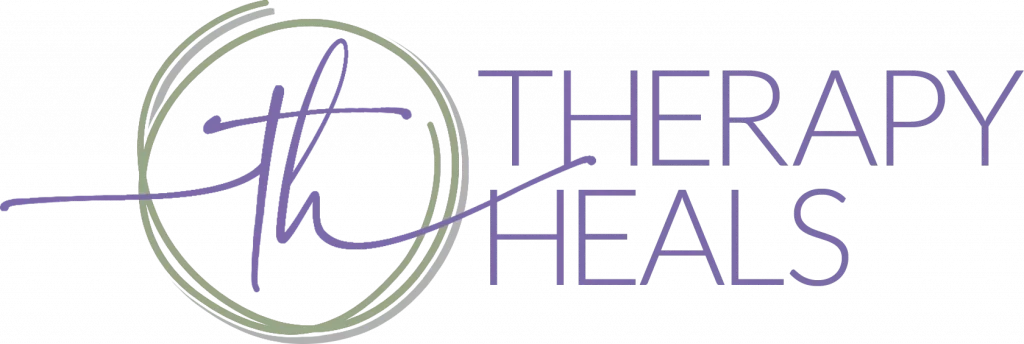 Monthly Newsletter: October 2023
Monthly Newsletter: October 2023
A MESSAGE FROM JENNIFER
October Greetings -
I love the fall in the Pacific Northwest. The trees turn vibrant colors before the leaves fall to the ground and I find the change in the weather refreshing. Already, I have enjoyed cozy sweaters, sitting by the fire, and eating apples from my tree. My experience here has taught me how short the fall season seems compared to the long winter about to follow. Albeit much longer than four months, grief is a season of its own. Much like the leaves falling gently to the ground, when you grieve, you are asked to slowly let go of what was once vibrant and alive. The sudden or unexpected death of your loved one makes it difficult to accept the abrupt devastation that has occurred in your life. Allow yourself to experience your season of grief for as long as needed but do not shut out the beauty and good from the world around you. Try and remember, that unlike the leaves that fall completely to the ground and disintegrate, your memories, connections, and love, will forever remain. Please join me this October in acknowledging the beauty of fall even within your season of grief.
HEATHER'S MESSAGE
A Reader’s Response to Suicide Prevention Month and the Needs of Grievers with Complex Challenges After Suicide
For the past several months I’ve worn my brightly colored bracelets that symbolize suicide awareness/suicide prevention and mental health awareness. During the month of September, national suicide and prevention/awareness month, I refused to wear these reminders.
My son Adam died of suicide on Saturday, July 30, 2022, at 3:14 am in the parking lot of a 7-11, just a few blocks from my home. The call last month for awareness and prevention was so loud in my head that it was thunderous. Every day through social media, news, and public officials, I would hear the daily calls for greater access to mental health resources and improved treatment options. But this all came too late for my son. It was as though I was being offered a fire extinguisher after my house had already burned to the ground.
After Adam’s death I knew I needed help. Intervention. I didn’t believe I could survive such a painful and traumatic loss. Truth be told: 99.9% of me didn’t want to. Fortunately, I was able to recognize that I needed help. But for many of us, actually reaching out for it isn’t always an easy thing to do. Knowing that our story might not be understood by others makes the grief that much more difficult to carry.
There are so many stories of suicide. Too many families and relationships touched by suicide loss. But what I am not hearing is a story like mine. There haven’t been any “me too” moments. Perhaps it is because my son’s suicide was at the hands of police officers after he led them on a high-speed chase. Throughout his adult life he dealt with mental illness and drug addiction. We tried to get him help but he wasn’t ready. He was doing fine, until he wasn’t. As hard as it has been for me to share my story with trusted friends, supportive family members, and compassionate clinicians, my story and many others like mine are rarely heard. We experience a disenfranchised grief: silent, lonely, and disconnected. Unable to grieve openly. This isn't ok.
The stories of suicide loss that make me the most angry are the ones where the loved one is found by a family member. I get upset when I hear them recall how they found their loved one, held them and said goodbye, even if they were already gone. I am heartbroken because I never had the chance to hold Adam or say goodbye. I envy those who did, and my heart also goes out to them. I held the hand of many of my loved ones that have passed as they took their last breath. I was denied that with my son Adam. My faith in God left with Adam that day.
The morning of July 29, 2022, was the last time I saw Adam alive. That evening I received a text message that I didn’t check until it was too late. It read “I love you it’s over watch the news”. The car chase and his death were televised. By the time I had figured out what was going on and made it to the scene, it was over. My son lay motionless in the driver's seat of a white van, I did not then, nor will I ever blame the police officers for what happened. They did their job. Things could have gotten worse if they allowed Adam to leave the parking lot and continue driving.
I hear about families that lost a child/loved one and the outpouring of help is incredible, beautiful. That didn’t happen for me or my children (I adopted two of Adam’s children, my grandchildren, several years earlier). My niece drove me home and I had to tell my then 10- and 12-year-old what happened to their dad. And then, there I was, alone to try and process what I had just witnessed. I needed help but who was going to want to help me? The mother of a criminal. In the neighborhood there were people that said Adam deserved it for running from the police. So, it was best to just keep my mouth shut and figure it out on my own. I didn’t feel like I deserved any help, even if I wasn’t the one that committed the crime. And by help, I mean comfort. I needed someone to sit with me in my grief. I was in my darkest hour, and I needed a connection with another human being.
Adam’s death has changed me and as strange as this may sound, it has changed me for the better. I found my voice that I didn’t have before. I have learned to make positive connections to people I would not have approached on my own. I have even cut connections to people that were not good for me. I don’t want this to sound insensitive, but Adam’s death has also been a relief. It took a while for me to admit this, and I am still not comfortable with this thought. But I no longer have to fear for him or be in fear of him. He was funny and curious and had a gentle and loving soul, he was an awesome kid! I really miss that. But as an adult he made some terrible choices and decisions which may have cost him his life.
My reason for writing this is to bring attention to the fact that everyone needs someone in their darkest hour. Everyone needs a lifeline for help. There is always someone left behind that is dealing with the fallout from a suicide. I can’t be the only mother who lost a son in such a gruesome way. When someone dies during a crime, what happens to the family? Are they offered help? I worry about the other moms that are left to deal with the fallout on their own. There are many stories out there just like mine and Adam’s and they need to be heard. It’s been one year and two months since I lost my son and friend. I still hurt every single day. I tell everyone I’m fine or I’m doing ok but I’m not and I never will be. I am learning to live with what happened. It is woven into every cell of my body. A huge part of me died with my son that day.
There are millions of us who have loved ones who have interactions with or have been impacted by the criminal justice system. Our stories and our need for support are just as important as those who have not interacted with the law. The stigmas in our society around having a criminal record and/or struggles with mental health and substance use need to stop. Our families need to be heard, seen, and understood.
The day Adam died I started on a journey I had never wanted to embark on. I resisted it for a long time. I didn’t want to heal. I am learning to trust this journey. The path is not always easy. But I am beginning to thrive, because I have to, I need to, and I want to.
Now that October has arrived, I will wear my bracelets again. They represent heartbreak and hope. Adam will live in my heart forever and I love to talk about him to anyone who cares to listen.
My son Adam was 35 years old when he died.
My son Adam was covered in a lot of tattoos.
My son Adam had a police record.
My son Adam struggled with drug addiction.
My son Adam suffered from mental illness.
My son Adam died while committing a crime.
And yet,
Adam was a son, a grandson, a cousin, a father, a friend.
Adam’s absence is felt in the core of my soul and beyond.
My son Adam’s death does not define his life. Nor does it define mine.
Heather Renfroe
Therapy Heals is so grateful to Heather for submitting this article. Regardless of the circumstances, we all need love, comfort, support, and guidance after the sudden or unexpected death of a loved one. Thank you to Heather for reminding us that loved ones with mental health problems, history of addiction, and/or criminal backgrounds also face complex challenges in their grief and require additional grief support.
RECOMMENDED RESOURCES
Art & Creativity for Healing
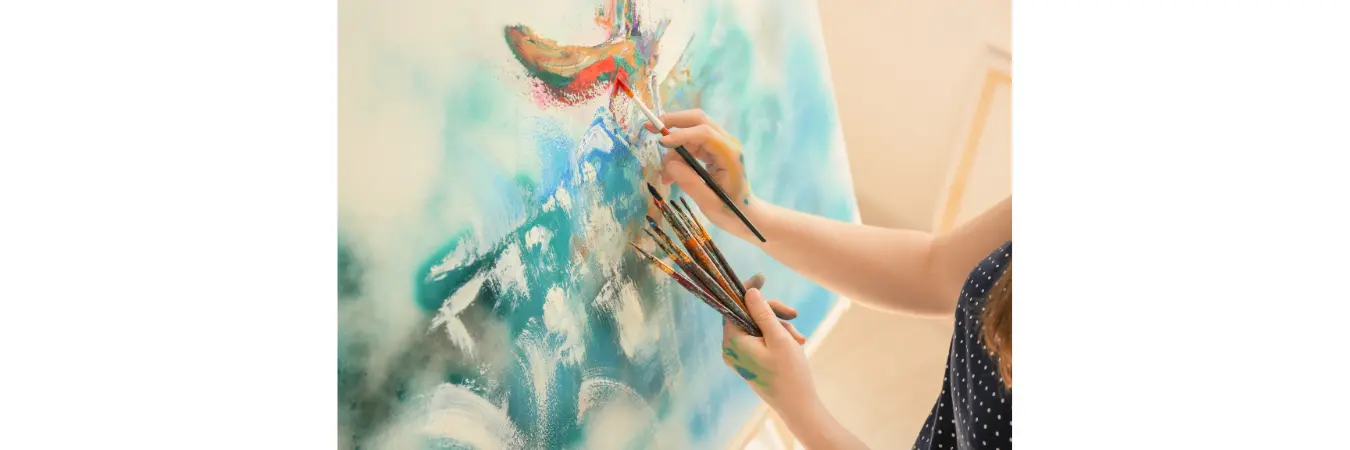
This month we invite you to explore Art & Creativity for Healing as a new way to explore and process your grief. The Art4Healing method is backed by research and 20 years of experience and offers a variety of healing workshops that participants can join online. Art4Healing has a bereavement program that provides participants an opportunity to express grief through acrylic paints on canvas, collage and journaling live via Zoom.
ANNOUNCEMENTS
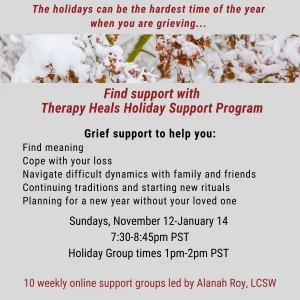 Now that October has arrived, many of us are keenly aware that the holidays will soon be upon us. While the holidays are meant to be a time to celebrate with family, when you have experienced the loss of a loved one you may be struggling just to get through the day. Memories of past years, your traditions, and expectations can trigger overwhelming grief. But you do not need to struggle alone throughout the holiday season. To meet the needs of our clients, Therapy Heals is pleased to announce the launch of our annual Holiday Support Program this November.
Now that October has arrived, many of us are keenly aware that the holidays will soon be upon us. While the holidays are meant to be a time to celebrate with family, when you have experienced the loss of a loved one you may be struggling just to get through the day. Memories of past years, your traditions, and expectations can trigger overwhelming grief. But you do not need to struggle alone throughout the holiday season. To meet the needs of our clients, Therapy Heals is pleased to announce the launch of our annual Holiday Support Program this November.
Led by our Director of Clinical Service, Alanah Roy, LCSW, our holiday program includes 10 weekly support groups, including meetings on Christmas Eve and New Year's Eve Day. Groups will support one another and discuss how to find meaning, cope with loss, and navigate challenging family dynamics during the holiday season. Participants will be provided with a holiday curriculum to guide discussions and provide suggestions to cope, develop individualized holiday plans, and plan for the new year without your loved one. We hope you will join us for connection, community, and support.
Sundays, November 12th - January 14th
7:30 PM - 8:45 PM PST
Holiday meeting time, 1-2 PM PST
Program Fee: $640
Reach out to alanah@therapyheals.com with questions or to register.
a

I hope you realize that every
day is a fresh start for you.
That every sunrise is a new
chapter in your life
waiting to be written.
-Juansen Dizon
CRISIS SUPPORT AFTER UNEXPECTED DEATH
Therapy Heals continues to provide crisis support after a sudden or unexpected death (in-person and virtually), to corporate, school, and community organizations. When an unexpected death occurs, most organizations are in a state of shock and crisis and many struggle with logistical details and responsibilities that must continue. We work with leadership teams to develop a plan to navigate through loss to ensure healing in the school and business environment. If your business, school, or community organization has experienced a sudden or unexpected death, contact Dr. Jennifer R. Levin at jennifer@responseforunexpecteddeath.com or text (626) 695-4211.
ADVANCE PLANNING FOR UNEXPECTED DEATH
Response and Preparation for Sudden or Unexpected Death is a program designed to help businesses, schools, and community organizations prepare for an unexpected death in the workplace. This resource seamlessly enables company leaders to respond in the most beneficial way to the impacted employee's family and as importantly, the entire organization and staff. The Response and Preparation resource includes a video and training guidebook: Preparing Leadership for Sudden and Unexpected Death in the Workplace, five employee grief resource sheets, 7 Essential Steps - Implementation for Sudden or Unexpected Death in the Workplace. Preparation for the unexpected invests in employee, staff, and student wellness. It also saves time, resources, and prepares organizations to lead during stressful times. For more information, please email Dr. Levin at jennifer@responseforunexpecteddeath.com directly, or click here.
PROFESSIONAL GRIEF EDUCATION
Therapy Heals is proud to announce our first professional education course - Foundations in Grief taught by Dr. Jennifer R. Levin. Due to unforeseen circumstances the course will now begin Monday, January 8th, 2024. This home study video course consists of six weekly modules and includes an interactive forum for online discussions about course concepts. This course is designed for mental health professionals, health professionals, first responders, or clergy who support and care for individuals living with grief. Weekly modules will address the following topics:
WHIDBEY ISLAND GRIEF RETREAT
Current plans are already underway for our 2024 retreat. If you are interested in learning more about the 2024 Whidbey Island Grief Retreat, please sign up now to join our waiting list.
IN CLOSING
Thank you for reading our monthly newsletter Therapy Heals: Guidance in Grief. As always, we welcome your feedback and suggestions for future editions.

